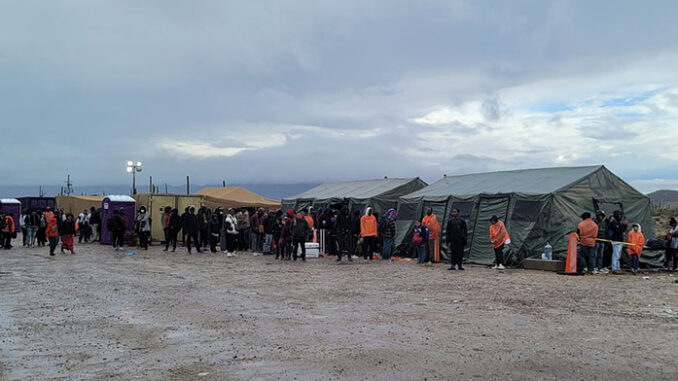
The southern border of Arizona has witnessed an unparalleled surge in migrant crossings into the United States, notably by individuals from Africa, particularly those originating from Guinea. Verified by sources within Customs and Border Protection (CBP), it has been established that African migrants are endeavoring to present themselves as younger than their actual age to navigate the immigration process.
“Officials from the Guinean government may be advising people obtaining new passports they can change their age for them to have a better chance of entering the United States as minors, the alert cautioned, alongside examples of authentic and doctored Guinean passports.
The Border Patrol notice advises agents on what to look out for and provides examples of real and fake Guinean passports. It warns that passports issued in the municipality of Conakry, Guinea’s capital, after June 2023 are “most likely fraudulent or altered.” – Fox News

An internal Border Patrol notice obtained by Fox News. It warns agents to be on the lookout for fake passports some illegal immigrants are using to pose as minors to enter the U.S. (US Border Patrol)
Lukeville: Migrant from Guinea shows me his passport that was issued by Conakry in September of 2023. It was reported by @FoxNews that fake passports from Conakry after June were being issued to alter the age in order to pretend they are unaccompanied minors to get into US. pic.twitter.com/1buPPyDEpC
— Sean Campbell (@scampbellfilms) January 3, 2024
Former Acting Department of Homeland Security Chad Wolf told “Fox & Friends” that the allegations surrounding faked passports were “very concerning” – particularly in the wake of December’s record number of migrants that crossed the southern border.
“Any time that you have such overwhelming numbers…it overwhelms the border patrol, and so the smugglers and the cartels, they know this,” Wolf explained.
Recently, a pair of Afghan nationals attempted to assume false Ecuadorian identities and were subsequently transferred to a Special Interest Alien (SPI) unit. This transfer was mandated by federal guidelines, necessitating additional scrutiny before any potential release consideration. After this incident, it has come to light that several individuals from the Middle East have also been redirected to the SPI unit, where their claims are presently under investigation. Should their assertions prove unfounded, deportation to their countries of origin will be executed.
In early December, Mexican authorities apprehended two Lebanese nationals suspected of affiliations with Hezbollah. However, there has been a notable absence of updates concerning their current legal status or whereabouts. It is crucial to underscore that Hezbollah orchestrates one of the most extensive operations involving drug trafficking, smuggling, and the forgery of documents and identity cards in Latin America. This intricate network operates in collaboration with the banking systems of both Iran and Lebanon.
In September, the U.S. Treasury implemented terrorism sanctions against a familial network comprising seven individuals and businesses situated in Lebanon and South America. They are alleged to be involved in financing the Hezbollah terrorist organization, with one Lebanese individual implicated in two fatal attacks in Argentina during the 1990s.
TRES SOSPECHOSOS DE TERRORISMO DETENIDOS
Tres sospechosos de pertenecer a células terroristas están siendo investigados. Mientras el mundo está convulsionado y en Argentina se desarrollan los Juegos Macabeos. Por instrucción del presidente Milei, estamos más atentos que nunca… pic.twitter.com/W2Yrr1Jx3m— Patricia Bullrich (@PatoBullrich) January 3, 2024
The Iran-backed group is designated a “foreign terrorist organization,” and Washington confirms the group is involved in drug trafficking and other illicit crimes in Latin America that generates billions of dollars in revenue.
Amidst the ongoing conflict in Israel within the Middle East, foreign entities have concurrently expanded their influence into Latin America. Meanwhile, the state of Arizona and the United States’ border region find themselves entangled in an economic struggle that harbors the potential for violence, particularly if the administration persists in neglecting the palpable threat looming at our southern border.
